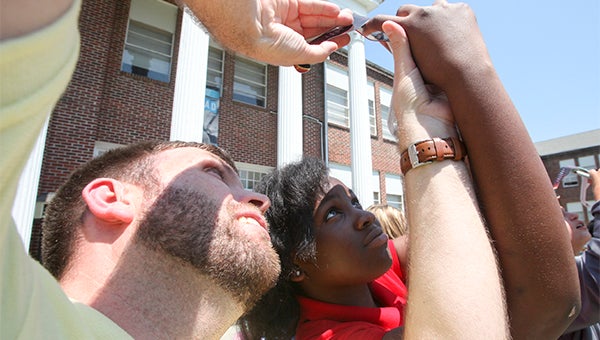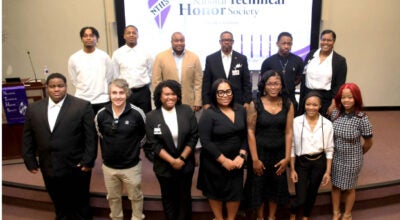Young and old here don special glasses, witness eclipse
Published 6:57 pm Monday, August 21, 2017

- John Graham assists Haley Judge, 7th grader at Academy of Innovation, with photographing partial solar eclipse in Vicksburg, Miss., Monday Aug 21, 2017. (Courtland Wells/The Vicksburg Post)
Solar eclipse glasses in hand and eyes pointed to the sky, people throughout Vicksburg braved the heat to witness the partial solar eclipse Monday afternoon.
The threat of rain held off and the clouds stayed away as the eclipse reached its peak in Vicksburg at 1:24 p.m.
“I thought it was great,” Sarah Davis, acting superintendent of Vicksburg National Military Park, said. “We had a lot of people, everybody was excited to see the kids running around, people bringing out their lawn chairs and just hanging out. It was really fantastic.”
Students at the Academy of Innovation, River City Early College and Bowmar Elementary took time out of the school day to view the phenomenon. Workers at the U.S. Army Engineer Research and Development Center donned welders’ masks and eclipse glasses to view the eclipse.
Viewers from near and far also gathered at the Vicksburg National Military Park for a program on the skies during the Civil War, before watching the eclipse reach its peak of 82 percent coverage.
“We were planning to stop in Vicksburg, we timed it to hit during the program,” Mark Evans, who stopped at the park along with his family on their way home to Fort Worth, said. “Doing the junior ranger program as well as seeing the eclipse for the first time for them, I remember as a kid doing something similar and I thought it would be a neat thing to share with them.”
During the program, park guide Rebecca Hoffman discussed various astrological events that occurred during the Civil War including comets and the Northern Lights and what they might have meant to the soldiers.
“The first of these great phenomena in the period of the Civil War was witnessed on April 7, 1861,” Hoffman said. “That is when a zodiacal light, which is a pillar of light fainter than the Milky Way, appeared. A mere two days later, on April 9, an asteroid named Maja was discovered in Cambridge, Mass. Then the very next day, through the 29th, there was a comet that was visible.”
The Civil War officially began two days after the comet first appeared when Fort Sumter was fired on on April 12, 1861.
“Naturally, with the appearance of the comet, people interpreted it as a sign of things to come and change,” Hoffman said. “They were right.”
Lucy Baddeley made the longest trek of those gathered at the military park. A resident of Oxford, England, she was visiting her daughter in Memphis and decided to come to Vicksburg for a mini trip.
This was the second eclipse she has had the chance to watch, with the first taking place in her native England.
“The one I saw in England, because I am a science teacher the physics department had set up lots of cameras and shadow cameras for us to look at. We had more information about the science behind it,” Baddeley said. “Here it has been more about the Civil War history. Having both has been a good balance.”
Baddeley said she enjoyed the chance to watch the eclipse in America because, “You can’t guarantee the sunshine in England. You know you are going to see it here. It is great.”
The last total solar eclipse to occur in the continental United States was Feb. 26, 1979. Although Vicksburg didn’t quite reach totality — the closest place that did was Nashville — the events proved to be an educational and memorable experience for those that viewed it.
“I have never seen it before and it was cool,” Olivia Scallions, 12, who attended the program at VNMP, said. “I didn’t expect that. I didn’t know that was what it was going to look like.”





